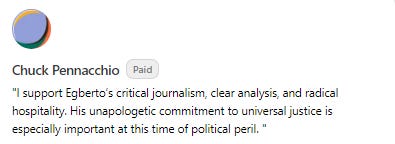Texas State Representative James Talarico calls out Christian Nationalists.
James Talarico did not mince his words as he called out the hypocrisy and evil within the Christian Nationalist movement.
A quick but important note before reading this prescient article
Our Paid Subscriber to Free Subscriber ratio is too low for long-term sustainability. WE NEED HUNDREDS MORE, especially in this political climate. Misinformation funded by the deep pockets of our Oligarchy floods the internet. We are using all our platforms on-air, online, and in publications to counter that. We ask that you invest the equivalent of less than a coffee to ensure we can keep doing this. Please invest in a Democracy that serves all of us by becoming a paid subscriber. It comes with many benefits.
James Talarico calls out Christian Nationalists.
In a stirring sermon, Texas State Representative James Talarico provided a powerful critique of Christian Nationalism, highlighting this movement’s hypocrisy and power dynamics. His remarks resonated deeply, shedding light on the dissonance between the professed values of Christian Nationalists and their actual political agenda. In a time where the intersection of religion and politics is increasingly fraught, Talarico’s words offer a crucial perspective on the true nature of Christian nationalism and its implications for American society.
Christian Nationalism, as Talarico eloquently argued, is not about fostering genuine Christian values but about imposing Christian dominance. This distinction is vital. While genuine Christian values emphasize love, charity, and humility, Christian nationalism seems more concerned with exerting control and influence. Talarico pointed out that this movement prioritizes symbolic gestures, such as placing prayer in schools and displaying the Ten Commandments, over substantive actions that would benefit communities, like providing free lunches to children or raising teachers’ salaries.
Talarico’s criticism exposes the core contradiction of Christian Nationalism: its selective application of religious principles. For instance, the push to include prayer in public schools often coincides with efforts to remove essential social services. This juxtaposition reveals an underlying agenda that is less about faith and more about wielding religion as a tool for political gain. By advocating for policies that promote exclusion and division under the guise of religious piety, Christian Nationalists reveal their true priority—power.
One of the most striking points in Talarico’s speech was his comparison of the Christian Nationalist agenda with the actions of prominent political figures they support. He highlighted the irony of Christian Nationalists advocating for candidates who blatantly violate the moral standards they claim to uphold. This hypocrisy is exemplified in their support for former President Donald Trump, whose actions and behavior starkly contradict the values espoused in the Ten Commandments. Trump, as Talarico noted, has repeatedly engaged in conduct that contradicts fundamental Christian teachings—lying, adultery, theft, and more. Yet, Christian Nationalists have rallied behind him, revealing a troubling willingness to overlook moral failings for political expediency.
The support for Trump among Christian Nationalists underscores a broader trend within this movement: the prioritization of political power over religious integrity. Despite his numerous ethical transgressions, this alignment with Trump suggests that the movement’s true objective is not moral or spiritual renewal but the consolidation of political influence. This revelation casts doubt on the sincerity of their religious rhetoric and calls into question the legitimacy of their moral crusade.
Moreover, Talarico’s remarks highlight the dangerous implications of Christian nationalism for American democracy. By intertwining religion with politics in such a divisive manner, Christian nationalists undermine the foundational principle of separation of church and state. This blending of religious dogma with political governance threatens the pluralistic fabric of American society, where diverse beliefs and values coexist. The imposition of a single religious perspective in public institutions not only alienates those of different faiths but also erodes the inclusive and democratic principles that underpin the nation.
Talarico’s sermon serves as a call to action for those who believe in a more inclusive and compassionate society. His critique encourages a reevaluation of the role of religion in politics, advocating for a return to genuine Christian values that emphasize love, justice, and equality. By exposing the contradictions and hypocrisies of Christian nationalism, Talarico invites a broader conversation about the ethical foundations of political leadership and the true meaning of moral governance.
State Representative James Talarico’s critique of Christian nationalism is vital to the ongoing discourse on religion and politics in America. His insights challenge the superficial piety of Christian Nationalists and reveal the power-driven motives behind their agenda. As Talarico poignantly demonstrated, the true measure of religious and moral leadership lies not in symbolic gestures but in actions that uplift and support the most vulnerable members of society. By holding political figures accountable to these standards, Talarico advocates for a more just and equitable future rooted in genuine Christian values rather than the pursuit of dominance and control.
This examination of Christian nationalism, inspired by Talarico’s powerful words, urges progressives and all who value true ethical governance to remain vigilant and active in advocating for policies that reflect the inclusive and compassionate ideals at the heart of genuine faith.
Viewers are encouraged to subscribe and join the conversation for more insightful commentary and to support progressive messages. Together, we can populate the internet with the progressive message that represents the true aspirations of most Americans.
Can we count on your help to reach our goal of 100 new paid subscriptions by the end of the month?
The other side has big donors and everyday citizens who invest heavily in platforms that lie and misinform. All we have is you. So, please invest in our media outlet by clicking the subscribe button below to become a paid subscriber. You won’t miss that coffee, but it will make a difference in our politics as we spread the truth about our policies and progressive politics. All paid subscribers get to read my five books on this platform and all subsequent books I write. They will also be privy to subsequent incentives.








Thanks for spotlighting Christian Nationalist hypocrisy and contradictions. It's mirrored among corporate Dems by blind support for Israel's ongoing genocide in Gaza and the West Bank — and calling conscientious opposition "anti-semitism".